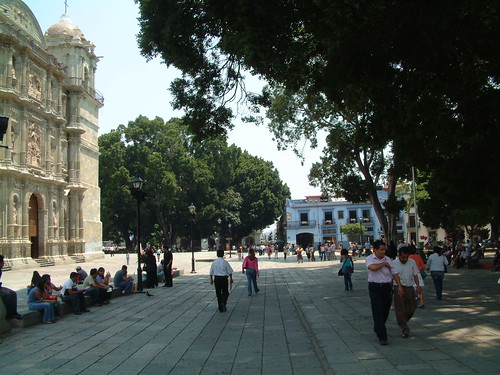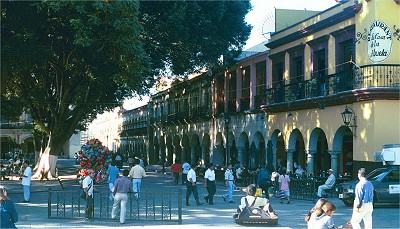You can also find these most of these topics in Gustavo Arellano's famous book "Ask A Mexican."
OPEN SEXUALITY
Despite the fact that Mexico is a Catholic country, the people are remarkably open about sexuality - in fact far more than our prudish American society. Men would commonly ask each other "Te gusta la muchacha/vieja?" ("Do you like that girl?"), and cat calls (known as "piropos" in Spanish) such as "mami!" are common (which the women usually ignore, but don't seem to mind either). If they're lusting for a random girl they see on the street, they just blurt it right out in an entertaining way. But it stops at that - they wouldn't try to touch or stalk the girls. I'm sure Americans would be thinking the same thoughts when they see random girls, but they are afraid to say anything out loud. Only "creeps" do such things, not "men." These poor folks truly are sexually repressed.
Well actually, Americans are often shocked when they see such behavior - that could land you in jail in the US! It's seen as outright sexual harassment instead of acceptable, expected male behavior. The women are approachable too, though they won't be sexually explicit as the men are.

UNINHIBITED LAUGHTER
Genuine, uninhibited laughter is ubiquitous in Mexico. Yelps of "ajuaaa" and "ayayayayyy!" are very common when people are listening to music or drinking. You'll hear them all the time in their happy-go-lucky songs too. Not only is this phenomenon socially acceptable among Mexicans, but it is even expected. On the other hand, your average sensible American would think they are crude, unrefined utterances only suited for crazy, drunk bums.
Now here are some examples from a street in an ordinary suburban residential neighborhood in Mexico. Now try to imagine this happening in the middle of a suburban American cul-de-sac. The neighbors would probably all call the cops on you if you tried to repeat the following in America. In the U.S., you would only occasionally see stuff like this in heavily segregated neighborhoods that are predominantly made up of first-generation Hispanics.
From Winston's e-book:
If you compare it to the laughter of foreigners (other than North Americans, British, and Orientals), you will notice that their laughter seems much more genuine, flowing, uninhibited, natural, and jovial. It‘s as if they are "allowed" to really enjoy themselves freely, whereas Americans are too consumed with being workaholics, duty-bound, and behaving properly, along with their private, reserved nature, to truly enjoy something too much. In other words, it‘s a "stuck-up" laughter that they have.
Even within the United States, you can see this difference between how Hispanics (Mexicans and other Latin Americans) and Americans laugh. You will notice that Hispanics have a stronger camaraderie and bond in their laughter.
PARKS
In American parks, lots of things are prohibited: loitering, vending, fishing, this and that. Not in Mexico.
Americans often wonder why Mexicans have the quirks of loitering in parks with cans of beers, hiring bands of musicians, and having huge picnics with their entire extended families. Conversely, many Mexicans find it odd about how the only Americans using the parks are those walking dogs around in loops (and just saying a superficial "hi") then heading straight back to their insulated little houses, unapproachable women jogging around the park with earbuds on, and grouchy high school kids riding their bikes home.
In nearly every Mexican town and city, there will be a plaza or "zócalo" where there will be vendors, musicians, plenty of little kids running around, and of course, guys sitting around on benches with nothing to do. Those guys would have a newspaper or magazine at most, and would not be completely occupied by their fancy iGadgets or portable music devices (which most Mexicans don't have anyways). The parks would actually be very alive! I also found that in parks in Mexico, many people would want to stop and get to know me. In the US, parks are squeaky clean and very quiet, with everyone generally keeping to themselves or their cliques.
I read somewhere that in Kenya, the locals would be puzzled at why the visiting Americans would have to always rush around and do something when they happen to have a little bit of free time on their hands. The Kenyans would sit around and do nothing - just relax.
I remember once when I told a high school teacher that I enjoyed a lot of live Mexican music over the weekend. She a little bit surprised and asked me if I went to a concert. I said no, it was just an ordinary park in a predominantly Hispanic neighborhood.


"ERES CASADO?"
Nearly every average, functional male in Mexico seems to be happily married, even if they don't make a lot of money. There is an increasing number of divorced and separated people though, but it's still far less than what you'd find in the US. A common question would be "eres casado?", with a tone of assuming the answer is likely to be a "yes." Even I get asked this question.
Americans wouldn't have this assumption. Why? Just look at the marriage AND divorce rates.
THE "GRITO"
The classic Mexican yelp. No explanation needed.

